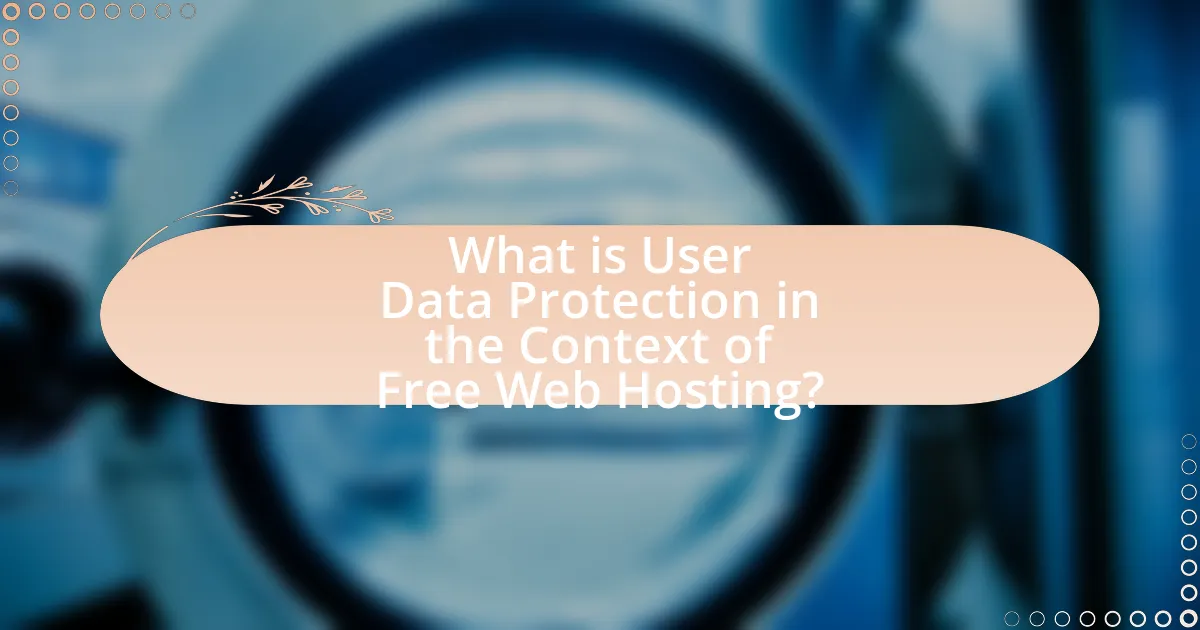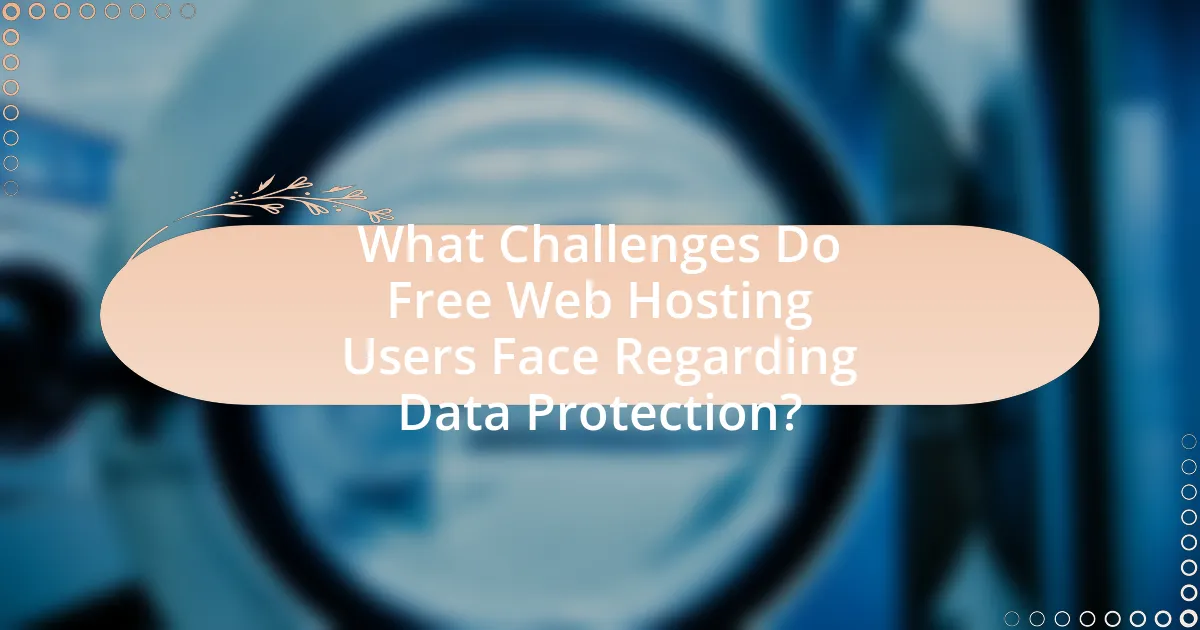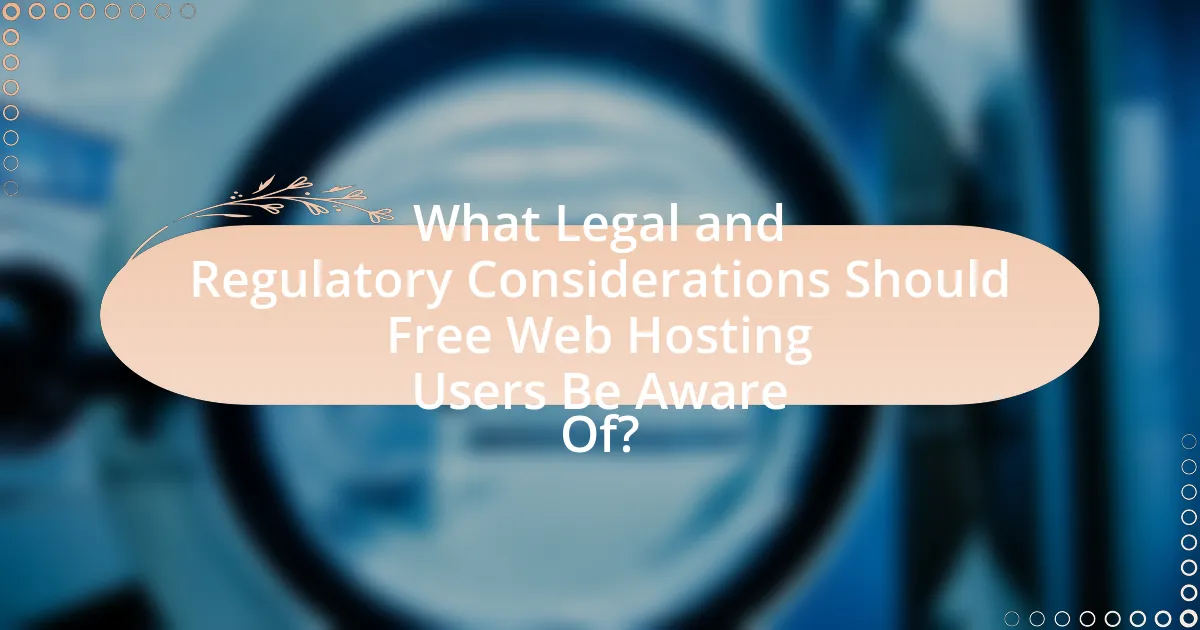User Data Protection is a critical concern for individuals utilizing free web hosting services, as these platforms often lack robust security measures, leaving personal and sensitive information vulnerable to breaches. This article outlines the importance of user data protection, the types of data at risk, and the potential impacts of data breaches on users. It also discusses key principles of data protection, including data minimization and user consent, while highlighting common vulnerabilities in free hosting environments. Additionally, the article addresses legal considerations, best practices for enhancing data security, and practical tips for users to safeguard their information effectively.

What is User Data Protection in the Context of Free Web Hosting?
User Data Protection in the context of free web hosting refers to the measures and practices implemented to safeguard personal and sensitive information of users who utilize free hosting services. These protections are crucial because free web hosting often comes with limited security features, making user data vulnerable to breaches, unauthorized access, and misuse. For instance, a study by the Ponemon Institute in 2020 highlighted that 60% of small businesses experienced a data breach, emphasizing the importance of robust data protection strategies. Effective user data protection in free web hosting includes encryption, secure access controls, and compliance with data protection regulations like GDPR, which mandates that organizations must protect user data and inform users about data handling practices.
Why is User Data Protection Important for Free Web Hosting Users?
User data protection is crucial for free web hosting users because it safeguards sensitive information from unauthorized access and potential misuse. Free web hosting services often lack robust security measures, making user data vulnerable to breaches. According to a 2021 report by Cybersecurity Ventures, cybercrime is projected to cost the world $10.5 trillion annually by 2025, highlighting the increasing risks associated with inadequate data protection. Without proper safeguards, free web hosting users may face identity theft, data loss, and reputational damage, underscoring the necessity of implementing strong data protection practices.
What types of data are typically at risk in free web hosting environments?
In free web hosting environments, sensitive data types at risk include personal information, login credentials, and financial details. Personal information such as names, email addresses, and contact numbers can be exposed due to inadequate security measures. Login credentials, including usernames and passwords, are vulnerable to breaches, as many free hosting services lack robust encryption protocols. Financial details, if stored or processed, can also be compromised, leading to potential fraud or identity theft. Studies indicate that free web hosting services often experience higher rates of cyberattacks, making user data particularly susceptible to unauthorized access and exploitation.
How can data breaches impact users of free web hosting services?
Data breaches can severely impact users of free web hosting services by exposing their personal information, leading to identity theft and financial loss. When a data breach occurs, sensitive data such as usernames, passwords, and email addresses can be accessed by malicious actors. According to a report by Verizon, 43% of data breaches involve small businesses, which often utilize free web hosting services, making them particularly vulnerable. This exposure can result in unauthorized access to user accounts, misuse of personal data, and potential legal ramifications for users if their data is exploited.
What are the key principles of User Data Protection?
The key principles of User Data Protection include data minimization, purpose limitation, consent, transparency, security, and accountability. Data minimization mandates that only necessary data should be collected and processed, reducing the risk of exposure. Purpose limitation requires that data is collected for specific, legitimate purposes and not used beyond those intentions. Consent emphasizes that users must give explicit permission for their data to be processed, ensuring their autonomy. Transparency involves informing users about how their data will be used, fostering trust. Security mandates implementing appropriate measures to protect data from unauthorized access and breaches. Lastly, accountability holds organizations responsible for complying with data protection laws and regulations, ensuring they can demonstrate adherence to these principles. These principles are foundational to frameworks like the General Data Protection Regulation (GDPR), which aims to enhance user privacy and data protection across Europe.
What does data minimization mean for free web hosting users?
Data minimization for free web hosting users means limiting the collection and storage of personal data to only what is necessary for the service to function. This principle helps protect user privacy by reducing the risk of data breaches and unauthorized access. For instance, if a free web hosting service only requires an email address for account creation, it should not request additional personal information that is not essential for providing the service. By adhering to data minimization practices, free web hosting providers can enhance user trust and comply with data protection regulations, such as the General Data Protection Regulation (GDPR), which mandates that organizations collect only the data they need for specific purposes.
How does user consent play a role in data protection?
User consent is fundamental in data protection as it establishes the legal basis for collecting, processing, and storing personal data. Consent ensures that individuals have control over their personal information, aligning with regulations such as the General Data Protection Regulation (GDPR), which mandates that consent must be informed, specific, and freely given. This framework protects users by requiring organizations to clearly communicate how their data will be used, thereby fostering transparency and accountability. For instance, under GDPR, organizations must provide users with the option to withdraw consent at any time, reinforcing the importance of user autonomy in data protection practices.

What Challenges Do Free Web Hosting Users Face Regarding Data Protection?
Free web hosting users face significant challenges regarding data protection, primarily due to limited security measures and lack of control over their data. Many free hosting services do not implement robust encryption protocols, leaving user data vulnerable to breaches. Additionally, these services often lack regular backups, increasing the risk of data loss. According to a 2021 study by the Cybersecurity & Infrastructure Security Agency, 60% of free hosting providers do not comply with basic security standards, further exposing users to potential threats. Furthermore, users typically have little recourse if their data is mishandled, as free services often come with minimal customer support and unclear terms of service.
What are the common vulnerabilities in free web hosting services?
Common vulnerabilities in free web hosting services include inadequate security measures, lack of regular updates, and shared resources leading to potential data breaches. Inadequate security measures often result from limited budgets, leaving users exposed to threats such as SQL injection and cross-site scripting. The lack of regular updates can leave software vulnerable to known exploits, as many free hosting providers do not prioritize maintenance. Additionally, shared resources mean that if one site on a server is compromised, others can be affected, increasing the risk of unauthorized access to sensitive user data. These vulnerabilities highlight the importance of understanding the risks associated with free web hosting services.
How can inadequate security measures expose user data?
Inadequate security measures can expose user data by failing to protect sensitive information from unauthorized access and breaches. For instance, weak passwords, lack of encryption, and outdated software can create vulnerabilities that hackers exploit. According to a 2021 report by Verizon, 81% of data breaches are linked to weak or stolen passwords, highlighting the critical need for robust security protocols. Additionally, the absence of regular security updates can leave systems open to known exploits, further increasing the risk of data exposure.
What role does shared hosting play in data security risks?
Shared hosting significantly increases data security risks due to multiple users sharing the same server resources, which can lead to vulnerabilities. In this environment, if one website is compromised, it can potentially expose the data of other websites on the same server, as they may share the same security protocols and resources. A study by the Cybersecurity & Infrastructure Security Agency (CISA) highlights that shared hosting environments are more susceptible to attacks such as cross-site scripting and SQL injection, which can exploit these shared resources. Therefore, the inherent nature of shared hosting creates a higher likelihood of data breaches and security incidents.
How can free web hosting users protect their data?
Free web hosting users can protect their data by implementing strong passwords, regularly updating software, and using encryption. Strong passwords reduce the risk of unauthorized access, while keeping software updated helps patch vulnerabilities that could be exploited. Encryption secures data during transmission and storage, making it unreadable to unauthorized users. According to a study by Verizon, 81% of data breaches are due to weak or stolen passwords, highlighting the importance of password strength in data protection.
What best practices should users follow to enhance data security?
To enhance data security, users should implement strong, unique passwords for each account and enable two-factor authentication (2FA) whenever possible. Strong passwords reduce the risk of unauthorized access, while 2FA adds an additional layer of protection by requiring a second form of verification. According to a 2020 report by Verizon, 81% of data breaches are linked to weak or stolen passwords, highlighting the importance of these practices. Regularly updating software and applications also mitigates vulnerabilities, as outdated systems are often targeted by cybercriminals. Furthermore, users should be cautious of phishing attempts and avoid clicking on suspicious links or attachments, as these are common methods for data breaches.
How can users identify trustworthy free web hosting providers?
Users can identify trustworthy free web hosting providers by evaluating their reputation, user reviews, and transparency regarding data protection policies. Reputable providers often have positive feedback from users on independent review sites, indicating reliability and service quality. Additionally, trustworthy providers clearly outline their data protection measures, such as encryption and compliance with regulations like GDPR. For instance, a study by HostingAdvice in 2021 highlighted that 70% of users prioritize data security features when selecting a hosting provider, reinforcing the importance of these criteria in decision-making.

What Legal and Regulatory Considerations Should Free Web Hosting Users Be Aware Of?
Free web hosting users should be aware of data protection laws, terms of service agreements, and potential liability for content hosted on their sites. Data protection laws, such as the General Data Protection Regulation (GDPR) in Europe, require users to understand how their data is collected, stored, and processed by the hosting provider. Additionally, terms of service agreements often include clauses that limit the provider’s liability and outline user responsibilities, which can impact users if legal issues arise. Furthermore, users may be held liable for copyright infringement or illegal content hosted on their sites, making it crucial to understand the legal implications of their content.
What laws govern user data protection for free web hosting services?
User data protection for free web hosting services is primarily governed by laws such as the General Data Protection Regulation (GDPR) in the European Union and the California Consumer Privacy Act (CCPA) in the United States. The GDPR mandates that organizations must protect the personal data and privacy of EU citizens, requiring explicit consent for data collection and providing rights to access and delete personal information. The CCPA similarly grants California residents rights regarding their personal data, including the right to know what data is collected and the right to opt-out of its sale. These regulations apply to free web hosting services that handle user data, ensuring compliance with stringent data protection standards.
How does GDPR affect free web hosting users?
GDPR affects free web hosting users by imposing strict regulations on how their personal data is collected, processed, and stored. Free web hosting providers must ensure compliance with GDPR requirements, which include obtaining explicit consent from users before processing their data and providing clear information about data usage. For instance, if a free hosting service collects user emails for account creation, it must inform users about how their data will be used and allow them to withdraw consent at any time. Non-compliance can result in significant fines, as the GDPR allows for penalties of up to 4% of a company’s annual global turnover or €20 million, whichever is higher. This regulatory framework aims to enhance user privacy and data protection, directly impacting how free web hosting services operate.
What are the implications of non-compliance for users?
Non-compliance with data protection regulations can lead to significant implications for users, including loss of personal data, identity theft, and legal repercussions. Users may experience unauthorized access to their sensitive information, which can result in financial loss and damage to their reputation. Additionally, companies that fail to comply with regulations may face hefty fines and legal actions, which can indirectly affect users through reduced service quality or increased costs. For instance, the General Data Protection Regulation (GDPR) imposes fines of up to 4% of annual global turnover or €20 million, whichever is greater, emphasizing the serious consequences of non-compliance.
How can users ensure compliance with data protection regulations?
Users can ensure compliance with data protection regulations by implementing robust data management practices, including obtaining explicit consent from individuals before collecting their personal data. This practice aligns with regulations such as the General Data Protection Regulation (GDPR), which mandates that consent must be informed, specific, and freely given. Additionally, users should regularly review and update their privacy policies to reflect current practices and ensure transparency about data usage. Regular training on data protection for all staff involved in handling personal data further supports compliance, as it fosters a culture of awareness and responsibility regarding data privacy.
What steps should users take to understand their rights?
Users should take the following steps to understand their rights: first, they should review the privacy policy of the web hosting service, which outlines how user data is collected, used, and protected. This document is legally required and provides essential information about user rights regarding data access, correction, and deletion. Second, users should familiarize themselves with relevant data protection laws, such as the General Data Protection Regulation (GDPR) in Europe or the California Consumer Privacy Act (CCPA) in the United States, which grant specific rights to individuals regarding their personal data. Third, users can consult resources from consumer protection agencies or legal aid organizations that offer guidance on data rights and protections. These steps ensure users are informed about their rights and can take appropriate action if they believe their data is mishandled.
How can users advocate for better data protection practices from providers?
Users can advocate for better data protection practices from providers by actively engaging in discussions about privacy policies and demanding transparency regarding data handling. By participating in forums, social media, and direct communication with providers, users can express their concerns and expectations for stronger security measures. Research indicates that consumer feedback can significantly influence corporate policies; for instance, a study by the International Association of Privacy Professionals found that 70% of companies adjusted their data practices in response to customer advocacy. This demonstrates that collective user action can lead to improved data protection standards.
What practical tips can free web hosting users implement for better data protection?
Free web hosting users can implement several practical tips for better data protection, including regularly updating passwords, using SSL certificates, and backing up data frequently. Regularly updating passwords minimizes the risk of unauthorized access, as weak or outdated passwords are a common vulnerability. Utilizing SSL certificates encrypts data transmitted between the user and the server, enhancing security against interception. Frequent data backups ensure that users can recover their information in case of data loss or breaches, which is crucial given that free hosting services may not provide robust recovery options.